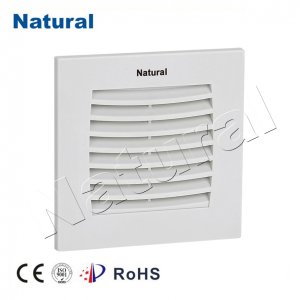In the realm of modern technology and industry, electrical panels play an indispensable role in powering various equipment and systems. These panels contain a complex network of components that generate heat as they operate. To ensure the optimal functioning and longevity of these systems, the integration of electrical panel fan filters has become a critical practice. This article delves into the significance of electrical panel fan filters in maintaining efficient operations and safeguarding equipment.

The Role of Electrical Panels: Electrical panels, often referred to as distribution boards or breaker boxes, serve as the central hub for controlling and distributing electricity to different circuits. These panels house an assortment of components such as circuit breakers, fuses, relays, and connectors. As electricity flows through these components, they generate heat due to resistance. Over time, excessive heat accumulation can lead to reduced performance, malfunctions, and even safety hazards. The Importance of Temperature Regulation: Temperature regulation is paramount in ensuring the reliability and longevity of electrical systems. Excess heat can accelerate component degradation, causing them to fail prematurely. This can result in unplanned downtime, increased maintenance costs, and potential safety risks. Electrical panel fan filters mitigate these concerns by facilitating proper airflow within the panel enclosure. Introducing Electrical Panel Fan Filters: Electrical panel fan filters are devices designed to improve ventilation and maintain an optimal temperature within the panel enclosure. These filters are strategically placed at openings on the panel’s surface and are equipped with fans that facilitate the movement of air. The filters serve a dual purpose: they prevent dust, debris, and contaminants from entering the enclosure, while simultaneously expelling hot air generated by the components. Advantages of Electrical Panel Fan Filters: Temperature Regulation:By expelling hot air and introducing cooler air, fan filters help regulate the temperature inside the panel enclosure, preventing overheating and ensuring consistent performance. Component Longevity:Improved ventilation provided by fan filters prolongs the lifespan of components, reducing the need for frequent replacements and maintenance. Efficiency:Panels operating within their optimal temperature range are more energy-efficient, resulting in lower energy consumption and operational costs. Dust and Contaminant Prevention:Fan filters act as a barrier against dust, dirt, and other contaminants that could compromise the functionality of sensitive electrical components. Safety Enhancement:Effective temperature regulation lowers the risk of electrical fires caused by excessive heat buildup, enhancing overall safety in the working environment. Choosing the Right Fan Filter: Selecting the appropriate fan filter for an electrical panel requires consideration of factors such as the panel’s size, heat output, and environmental conditions. Fan filters are available in various sizes and configurations to accommodate different panel specifications. Installation and Maintenance: Proper installation of fan filters is essential to ensure optimal performance. Regular maintenance, including cleaning or replacing filters as needed, is crucial to maintain efficient airflow and temperature regulation. Conclusion: Incorporating electrical panel fan filters is a proactive measure that enhances the efficiency, reliability, and safety of electrical systems. By regulating temperature, preventing dust buildup, and improving overall airflow, these filters contribute to the smooth operation of equipment, minimize downtime, and extend the lifespan of critical components. In the dynamic landscape of technology and industry, investing in these filters proves to be a prudent choice for any organization seeking to maximize the performance and durability of their electrical panels.